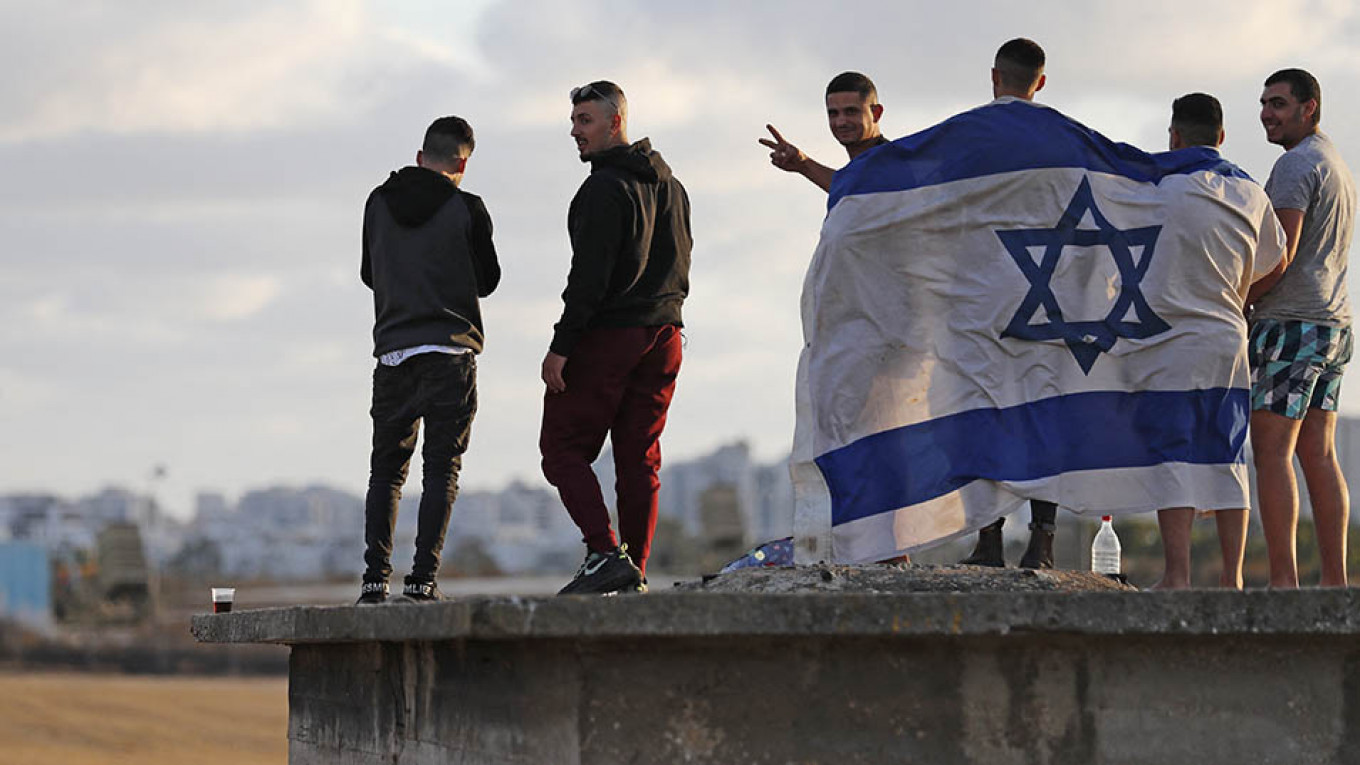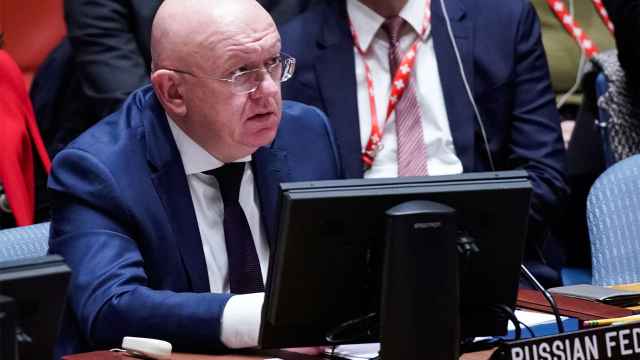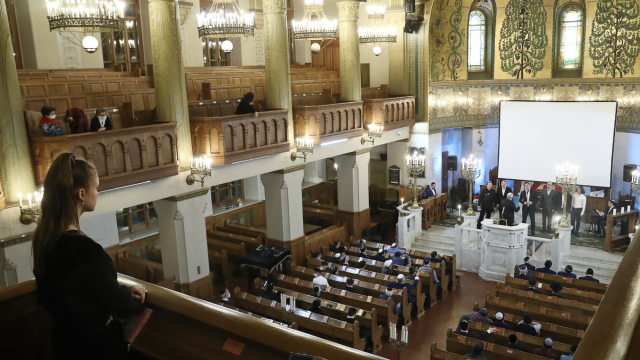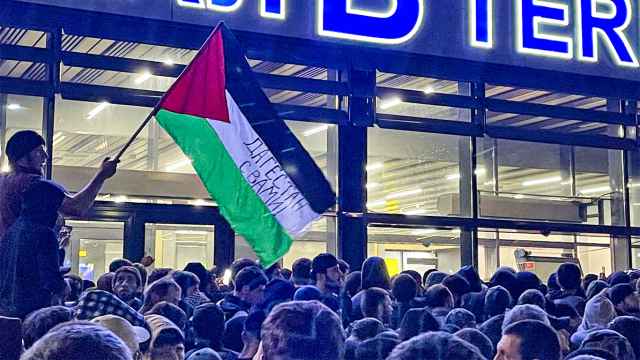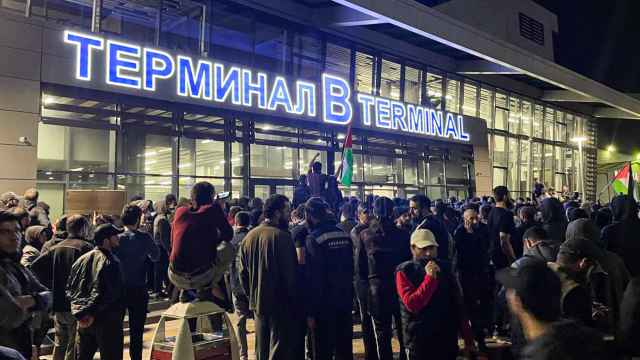“I would like to thank U.S. President Joe Biden and other countries, including European countries, that have flown the Israeli flag on government buildings in solidarity”, said Israeli Prime Minister Benjamin Netanyahu on Saturday.
“And I thank U.S. President Joe Biden for his clear and unequivocal support”.
Netanyahu did not thank his “other friend”, Russian President Vladimir Putin, which was not surprising considering that the Russian leadership has not so much as spoken to Israeli or Palestinian officials since the outbreak of hostilities more than one week ago, much less express solidarity with either.
Putin last spoke with Netanyahu on May 7, which was before the conflict escalated in Gaza, but after several weeks of clashes in East Jerusalem. During their conversation, Putin did not even refer to the Palestinian-Israeli conflict. Instead, he sought common ground on how the two countries view World War II. He also discussed bilateral trade and economic relations and the situation in Syria.
Not until almost one full week had passed from the time Hamas began shelling Israeli cities from the Gaza Strip and Israel launched retaliatory air strikes on Palestinian territory did President Putin address the permanent members of the Russian Security Council.
“I would like to ask our colleagues to speak about the situation in the Middle East”, he said, “namely, about the aggravation of the Palestinian-Israeli conflict, which is taking place in close proximity to our borders and directly concerns our security interests. ”
Many Israelis were surprised to hear of this expanded definition of Russia’s borders, but Moscow had previously noted that the escalation of hostilities in the Middle East was taking place in proximity to Russia, particularly regarding Syria and “the spread of the terrorist threat from there”.
Beyond that issue, though, is the fact that Russia itself has a major presence in the region — in Syria.
If Lebanese Hezbollah “resistance forces” and other pro-Iranian Shiite groups decide to open a second front with Israel from Lebanon and Syria, and if Israel responds with massive strikes against these countries, it would cause serious damage to Russia’s position, not to mention threaten Russian military and civilian personnel in the region.
Clearly, Moscow does not want to have to choose between its two allies in the region.
Explaining what Putin meant by the proximity of the region to Russia’s borders, Kremlin Press Secretary Dmitry Peskov said, “Many countries [there] have difficult relations. The region has a somewhat fragile system of security and a huge lack of mutual trust. The potential for conflict does not contribute to the stabilization of the region. The Middle East is not on another continent, it is a region adjacent to us. Were this conflict to continue and spread uncontrollably, it would obviously pose a danger” to Russia, he added.
He said that Moscow urges the parties involved not to pursue a military solution to the Palestinian-Israeli conflict.
He also said that Putin would speak with Palestinian President Mahmoud Abbas and Israeli Prime Minister Benjamin Netanyahu “if necessary”. Over the course of a week of fierce fighting, no such necessity arose. And yet, President Joe Biden, who has generally refrained from inserting himself into the conflict, did speak to both Middle Eastern leaders.
Moscow, however, is in no hurry. It realizes the general futility of such discussions, especially given the fact that Mahmoud Abbas is not a party to the conflict: Hamas unleashed the war in the Gaza Strip behind his back.
But the absence of senior-level contacts does not mean Russian has been doing nothing. In fact, Foreign Minister Sergei Lavrov spoke by phone this past week with his counterparts in Jordan and Egypt, the two countries most able to influence the situation right now.
Cairo was and still is the main negotiator for a cease-fire between Israel and Hamas, but its efforts have been unsuccessful so far.
Russia fully supports Cairo’s efforts and stands ready to act as a go-between in the region. For this reason, Hamas urgently reached out to Russian diplomats recently. On May 12, at the initiative of the Palestinian side, Russian Deputy Foreign Minister for the Middle East and Africa Mikhail Bogdanov held a telephone conversation with Hamas Political Bureau Deputy Chairman Mousa Mohammed Abu Marzook.
In this conversation, as well as in conversations with Israeli diplomats and in their public statements, Russian officials have emphasized the ne ed for an immediate end to the violence and the unacceptability of attacks on civilians, regardless of their national and religious affiliation.
“We strongly condemn the use of force and violence against civilians”, they said. According to diplomatic sources, this is unusually strong language for Moscow.
Russia takes an emphatically neutral position on the Palestinian-Israeli conflict, while insisting on addressing the root causes of the conflict. In other words, as worthwhile and necessary as a cease-fire is, what would come next? Another escalation of hostilities?
Russia argues that the lack of a direct negotiation process is the main reason for the current escalation.
In recent days, the Russian Foreign Ministry has repeatedly stressed the necessity of observing the status quo set forth in the Israel-Jordan peace treaty regarding the Holy Sites in Jerusalem and all UN Security Council resolutions concerning the city, as well as attempts to change the geographical, demographic and historical character and status of East Jerusalem.
Moscow also considers the expansion of Israeli settlement activity to be harmful in general.
In fact, Moscow focuses on reviving a long-forgotten mechanism for settling the conflict, the so-called Middle East “quartet” of mediators: Russia and the U.S., EU and UN.
Russia also advocates direct negotiations between the Palestinians and Israelis.
The Krelim continues to offer its own platform for such talks, and despite knowing its offer will not be accepted, continues to assert that there is no alternative to the peace process.
Russia and the EU had begun attempts to revive the “quartet” after the change of the presidential administration in Washington. Under former U.S. President Donald Trump, Washington ignored UN Security Council resolutions and collective settlement mechanisms with respect to the Middle East and elsewhere.
The Trump administration replaced the search for a Middle East settlement with efforts to normalize relations between Israel and the Arab countries. Moscow welcomed this normalization process, but it warned at the time that it should not replace a settlement of Palestinian-Israeli differences based on UN Security Council resolutions.
The Arab countries themselves support this position. Russia will do everything it can to help. In fact, Russia is the only non-Arab mediator that maintains communication with Hamas, a strongpoint among the members of the “quartet”.
A Message from The Moscow Times:
Dear readers,
We are facing unprecedented challenges. Russia's Prosecutor General's Office has designated The Moscow Times as an "undesirable" organization, criminalizing our work and putting our staff at risk of prosecution. This follows our earlier unjust labeling as a "foreign agent."
These actions are direct attempts to silence independent journalism in Russia. The authorities claim our work "discredits the decisions of the Russian leadership." We see things differently: we strive to provide accurate, unbiased reporting on Russia.
We, the journalists of The Moscow Times, refuse to be silenced. But to continue our work, we need your help.
Your support, no matter how small, makes a world of difference. If you can, please support us monthly starting from just $2. It's quick to set up, and every contribution makes a significant impact.
By supporting The Moscow Times, you're defending open, independent journalism in the face of repression. Thank you for standing with us.
Remind me later.



